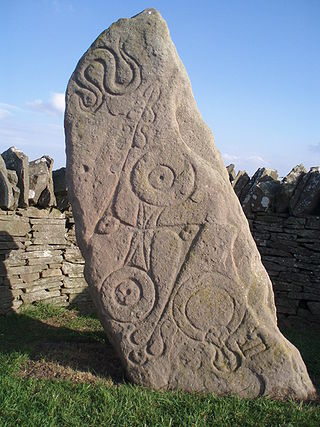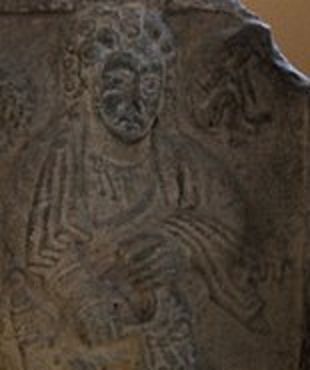Related Research Articles
Kenneth MacAlpin or Kenneth I was King of Dál Riada (841–850), and King of the Picts (848–858), of likely Gaelic origin. According to the traditional account, he inherited the throne of Dál Riada from his father Alpín mac Echdach, founder of the Alpínid dynasty. Kenneth I conquered the kingdom of the Picts in 843–850 and began a campaign to seize all of Scotland and assimilate the Picts, for which he was posthumously nicknamed An Ferbasach. He fought the Britons of the Kingdom of Strathclyde and the invading Vikings from Scandinavia. Forteviot became the capital of his kingdom and Kenneth relocated relics, including the Stone of Scone from an abandoned abbey on Iona, to his new domain.

The Picts were a group of peoples in what is now Scotland north of the Firth of Forth, in the Early Middle Ages. Where they lived and details of their culture can be gleaned from early medieval texts and Pictish stones. The name Picti appears in written records as an exonym from the late third century AD. They are assumed to have been descendants of the Caledonii and other northern Iron Age tribes. Their territory is referred to as "Pictland" by modern historians. Initially made up of several chiefdoms, it came to be dominated by the Pictish kingdom of Fortriu from the seventh century. During this Verturian hegemony, Picti was adopted as an endonym. This lasted around 160 years until the Pictish kingdom merged with that of Dál Riata to form the Kingdom of Alba, ruled by the House of Alpin. The concept of "Pictish kingship" continued for a few decades until it was abandoned during the reign of Caustantín mac Áeda.

The Battle of Dun Nechtain or Battle of Nechtansmere was fought between the Picts, led by King Bridei Mac Bili, and the Northumbrians, led by King Ecgfrith, on 20 May 685.
MacAlpin's treason is a medieval legend which explains the replacement of the Pictish language by Gaelic in the 9th and 10th centuries.

Óengus son of Fergus was king of the Picts from 732 until his death in 761. His reign can be reconstructed in some detail from a variety of sources. The unprecedented territorial gains he made from coast to coast, and the legacy he left, mean Óengus can be considered the first king of what would become Scotland.

Bridei son of Maelchon was King of the Picts from 554 to 584. Sources are vague or contradictory regarding him, but it is believed that his court was near Loch Ness and that he may have been a Christian. Several contemporaries also claimed the title "King of the Picts". He died in the mid-580s, possibly in battle, and was succeeded by Gartnait son of Domelch.
Naiton son of Der-Ilei, also called Naiton son of Dargart, was king of the Picts between 706–724 and between 728–729. He succeeded his brother Bridei IV in 706. He is associated with significant religious reforms in Pictland. He abdicated in 724 in favour of his nephew and became a monk. In 728 and 729 he fought in a four-sided war for the Pictish throne.
Dark Mirror or The Dark Mirror may refer to:

Fortriu was a Pictish kingdom recorded between the 4th and 10th centuries. It was traditionally believed to be located in and around Strathearn in central Scotland, but is more likely to have been based in the north, in the Moray and Easter Ross area. Fortriu is a term used by historians as it is not known what name its people used to refer to their polity. Historians also sometimes use the name synonymously with Pictland in general.
Uurad or Ferat son of Bargoit was king of the Picts, from 839 to 842.
Conall mac Taidg was a king of the Picts from 785 until 789. Very little is recorded of Conall. He is mentioned twice by the Irish annals, the most reliable source for the history of Northern Britain in the years around 800. He also appears in later king lists.
Drest was king of the Picts from 724 until 726. He succeeded Nechtan mac Der-Ilei when the latter abdicated and entered a monastery in 724.

The origins of the Kingdom of Alba pertain to the origins of the Kingdom of Alba, or the Gaelic Kingdom of Scotland, either as a mythological event or a historical process, during the Early Middle Ages.

Juliet Marillier is a New Zealand-born writer of fantasy, focusing predominantly on historical fantasy.
Talorg son of Uuid was a king of the Picts from 641 to 653.

Many writers have been drawn to the idea of the Picts and created fictional stories and mythology about them in the absence of much real data. This romanticised view tends to portray them as sometimes wearing the modern kilt or as noble savages, much as the view of Europeans on Native Americans in the 18th century.

Wildwood Dancing is a young adult fantasy novel written by Juliet Marillier, and published by Pan Macmillan Australia in 2006. The publication of Wildwood Dancing follows soon on the heels of previous highly anticipated collections by Juliet Marillier: The Sevenwaters Trilogy, and The Bridei Chronicles.

The Picts, the pre-Gaelic people of eastern Scotland, have frequently been represented in literature and popular culture.
The Battle of 839, also known as the Disaster of 839 or the Picts’ Last Stand, was fought in 839 between the Vikings and the Picts and Gaels. It was a decisive victory for the Vikings in which Uuen, the king of the Picts, his brother Bran and Aed son of Boanta, King of Dál Riata, were all killed. Their deaths led to the rise of Kenneth I and the formation of the Kingdom of Scotland, as well as the disappearance of Pictish identity. It has therefore been described as "one of the most decisive and important battles in British history."
References
- ↑ "The Dark Mirror: Book One of the Bridei Chronicles by Juliet Marillier". Publishers Weekly . 6 June 2005. Retrieved 13 August 2024.
- ↑ "Blade of Fortriu: Book Two of the Bridei Chronicles by Juliet Marillier". Publishers Weekly . 11 September 2006. Retrieved 13 August 2024.
- ↑ "The Well of Shades: Book Three of the Bridei Chronicles by Juliet Marillier". Publishers Weekly . 26 February 2007. Retrieved 13 August 2024.